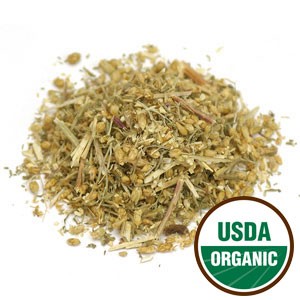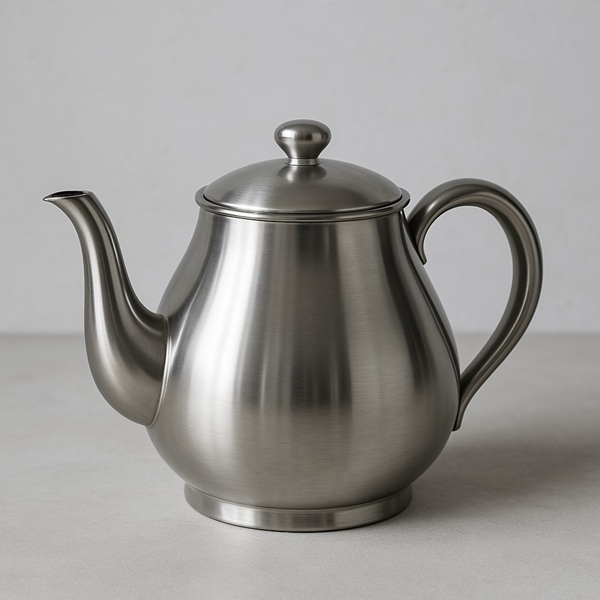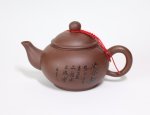Yarrow Tea
-
The Herbal Bandage
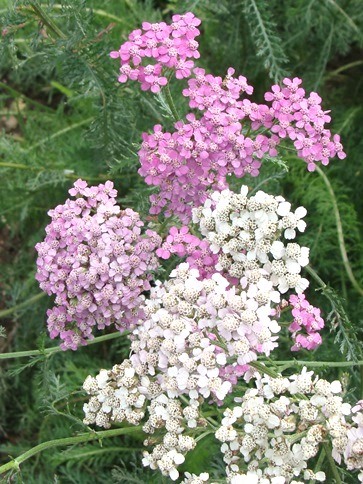
For centuries people have resorted to this European herb to treat inflammation and disinfect scraped skin.
There are so many more benefits that you can get from this herbal infusion hopefully you will soon add it to your pantry.
So come and let s take a look at this healing tea!
What is Yarrow?
Yarrow, achillea millefolium in Latin, is a hardy perennial plant native to the temperate regions of Europe and Asia and has since spread to other continents such as North America and Australia and so today it can be found worldwide.
The scientific name Achillea comes from the name of Achilles the Greek hero who used this herb to heal himself and his soldiers, and Millefolium is a reference to the multitude of fine feathery leaves that characterize this plant.
Its many historical uses have spawned throughout the ages a variety of other common names such as: nosebleed, woundwort, old man's pepper, thousand-leaf, carpenter's weed, herba militaris or soldiers wound wort. Names either refer to the lovely leaf structure or to the blood-staunching properties of yarrow.
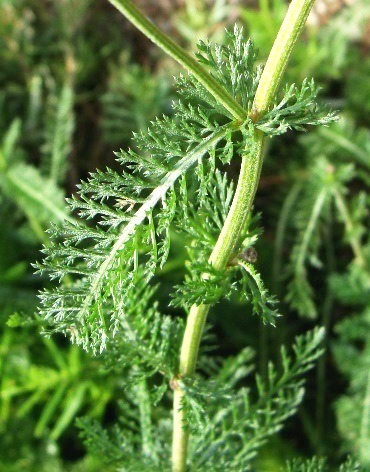
It is often compared to a weed as it grows in waste areas, the sides of roads, along fences, lawns, edges of train tracks, filling the air with a chrysanthemum-like aroma.
It has several long, thin green stems from which grow fine green leaves that are fern-like, feathery and highly segmented from as small as 5cm long to as big as 20cm long.
It is the appearance of the leaves that give the plant its scientific name.
Typically yarrow blooms from May to September, or sometimes as late as November, producing clusters of tiny white, pink, red or violet disk-shaped flowers.
Each cluster may have as many as 15 to 40 little flowers arranged in a flat-topped display.
Its beautiful flowers make it a wonderful ornamental plant in many gardens. It can be used both to help enrich soils as well as a landscaping feature, preventing soil erosion.
History of Yarrow
Yarrow has been found to have a long history dating back to the Neanderthals, over 60,000 years ago. Our ancestors used yarrow as a medicinal herb to treat minor wounds, stop bleeding and inflammation.
Over 3000 years ago the ancient Greeks used this herb to treat wounds and fight fevers while promoting circulation. As stated above, this herb is associated with the Greek hero Achilles, who would treat his wounds as well as his soldiers' using yarrow leaves and flowers. The leaves would also be ingested in a tea to stop fevers or digestive issues.
For centuries the Chinese also used yarrow in their rituals, having recognized its healing potential for the body's main organs. They claimed that this herbal tea had the potential to enhance the mind, energize the body and brighten the eyes.
By the Middle Ages, yarrow was very much a part of European medicinal culture, being part of folk customs for protection and incantations in Britain as well as flavoring beer before the use of hops.
Early European colonists took yarrow to America where it was soon naturalized and became an important part in the traditional medicine of the Native Americans, treating wounds, infections and stopping bleeding. Different tribes would use it for earaches, as a sedative or to treat a cold or break a fever.
By the 17th century, this herb had become popular as an edible vegetable to be used in cooking soups or stews or as herbal tea to provide health benefits. It never stopped being used for its wound-treating abilities. It is believed that it was used during the American Civil War to help treat wounded soldiers.
Today yarrow is still planted both for medicinal uses as well as for its gardening value. Many people still like to use this herb in cooking, either a vegetable like spinach in a salad or soup, or as a herb to replace fresh or dried tarragon in recipes. It can be placed in oils and vinegar to add a touch of flavor.
Yarrow has found its way into the cosmetic industry, serving as an ingredient in cleansers and shampoos. Flowers and leaves also serve to add flavor to soft drinks, liquors and bitters.
People have not stopped using this herb medicinally, still brewing it into a tea for its many health benefits.
Yarrow Tea Benefits
Yarrow contains a variety of components that allow you to make a rich and nourishing cup of tea. It contains vitamins A, B-complex, C and E, bioflavonoids, choline, iron, magnesium, phosphorus, potassium, selenium, silicon, sodium, amino acids, bitters, flavonoids, terpenes, and tannins among many others.
Together with other phytochemicals, yarrow tea may provide with some of the following benefits.
Flu and Cold Remedy
- Yarrow tea is great when the first symptoms of a cold or the flu set in. It may help clear up mucous and relieve congestion, allowing to breathe better. This herb is said to help fight the infection that causing you to be ill. It may also soothe a sore throat and strengthen your lungs.
- Drinking this tea when you have a high fever will help to promote natural sweating and thus could break your fever in a safer and healthier way. Sweating is a way that the body has of expelling the microbes and bacteria. So have a hot cup of tea and stay under a warm blanket.
- A cup of this herbal tea is also said to help when you are suffering from allergies or hay fever. It may dry up your nasal passageways, which can be quite a relief when you have been sneezing all day because of dust or pollen.
- Its calming and antispasmodic nature may also bring some calm and relief if you suffer from asthma. Yarrow tea may help to reduce the severity of your attacks.
Digestive Tea
- Have a cup of yarrow tea if you are prone to indigestion or heartburn, as this tea promotes bile production that stimulates digestion, preventing food from staying in your stomach too long and causing pain. It is the bitter components of this tea that are said to get your stomach to work better and faster.
- At the same time, this tea may improve your digestive health by protecting the lining of the stomach from infection and inflammation and soothing stomach muscle spasms that could lead to painful cramps. This tea may offer relief from a stomach flu, nausea, vomiting and even gastritis.
- By stimulating the production of digestive juices and bile, you are also helping to prevent the formation of gallstones and so keeping your gallbladder happy and healthy.
- Drinking yarrow tea may also protect and boost the health of your intestines. It is said that it helps to soothe bloating and flatulence as well as possibly treat colic and diarrhea. It may help to coat the inner lining of your intestines thus also preventing inflammation and cramping.
- Talk to your doctor about using this herbal tea as a possible remedy for colitis or diverticulitis. More serious and chronic digestive conditions should be followed up with a doctor, so that proper testing can be done.
- As you use this herbal tea to improve your digestive health expect to feel an increase in appetite, so make sure to eat healthy so as not to hinder the healing process and gain excessive weight in the process.
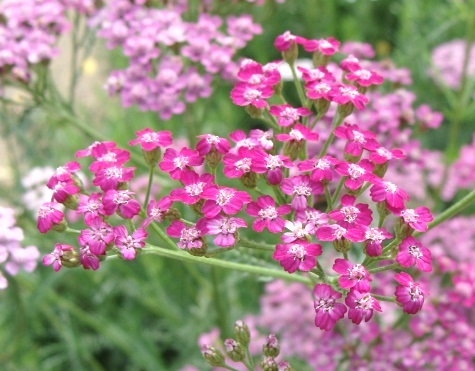
Heart and Blood Tonic
- One of the most popular benefits of yarrow tea is its ability to stop bleeding, internally and externally. It said to help stop internal bleeding. Of course, any such situations, either in the lungs or digestive tract, should be followed up with a doctor in order to discard the possibility of a more serious problem.
- Drinking this tea is said to improve blood flow, by purifying the blood of toxins and bacteria as well as boosting circulation where there are possible situations of stagnation. Poor circulation can be felt when you have cold hands or feet and this tea may help you with that.
- Yarrow tea may also serve as a heart tonic, by not only toning, but also strengthening and dilating your blood vessels. As a result this tea may help to regulate your blood pressure and reduce the risk of blood clots that could cause serious heart complications. This could also help with varicose veins.
- If you are taking any form of heart medication or blood thinners, make sure to talk to your doctor first, as this tea may dangerously alter the effects of your medication.
Liver Tonic
- Yarrow herbal tea may also tone your liver, stimulating its activity and providing balance when you need it. The chemical components of yarrow are said to actually protect the liver and get rid of any elements that may cause harm to it.
- This tea serves to detoxify the liver, helping to keep hormonal production in check and allowing you to deal with issues like depression better. Find out how it can also help with anxiety and stress next.
Sedative Tea
- Yarrow tea is known for analgesic and calming properties. It is said to soothe pain and allow you to recover from illness or simply relax better by toning down tension and cramps.
- If you are feeling fatigued, but have a hard time falling asleep, you may consider drinking a cup of this herbal tea as it is said to relax the mind and the body. Sometimes all you need is just something to nudge you off to sleep. It may treat insomnia and protect your mind from exhaustion.
- A cup of yarrow tea may serve as sedative in case of mild anxiety. If you feel stressed or tense, then consider drinking a cup of this tea. This nerve tonic could help lift your spirits as well as calm the mind enough to let you see more clearly what the source of your anxiety is.
- Sometimes we all need a little help dealing with the complicated situations of our daily lives. Yarrow tea could be a healthy companion that allows you to cope with the tension of everyday life. It should not be taken in place of other similar prescription medications, but you can talk to your doctor about it.
Immunity Booster
- Drinking this tea can help boost your immune system defenses. Yarrow is said to be anti-inflammatory, helping to expel from your body toxins that could be causing your harm. You have already read how this tea can help your respiratory and digestive systems, but there are so many more ways this tea can help.
- This ability could turn yarrow into a great infusion to help if you suffer from stiff joints and rheumatism. It said that this tea could flush out the inflammation as well as boost circulation to the affected areas, helping to soothe the pain and let you move about better.
Tea for Urinary Infections
- Drinking yarrow tea could increase urine production; this is because this tea is a diuretic that may help to flush out excessive fluids. For some, this could be a way of dealing with water retention.
- Taking this tea could help clear out bladder or kidney infections. It could be a good way to help calm an irritated bladder and treat a minor ailment. Keep sure to monitor your condition, as more serious ailments require more extensive exams that should be done by your doctor.
- It is said that clearing out your urinary system of harmful agents and calming the smooth muscles that support could help deal with night incontinence. While yarrow may increase your urge to urinate, it could also deal with what is causing your continence. Consult with your doctor for more advice on your situation.
Tea for Women
- Yarrow tea serves as a tonic for women. It is said to be helpful to regulate menstruation, stimulating it when it is absent or delayed, reducing heavy bleeding when these occur. If heavy bleeding continues, this is something to look into with your gynecologist.
- This tea may stimulate the uterus in a way that will help to better regulate your cycles, toning the uterus and easing painful menstruation, cramps and uterine congestion. Drinking yarrow tea could help also prevent uterine fibrosis and endometriosis.
- By also toning your liver and balancing your hormonal production, this tea could help ease PMS symptoms and down the road, it could help you to deal with symptoms of menopause.
- Yarrow tea also has a reputation of helping to cleanse the uterus after a miscarriage and stopping excessive bleeding after a birth. However, you should never attempt to do this on your own as what works for some women but not necessarily for every woman and could be quite dangerous. Seek your doctor s advice on this.

External Benefits
- The ability to treat wounds and cuts is one of the best known benefits of this tea. It is certainly one of the reasons that this herb has been venerated for ages. So let your yarrow tea cool down and then apply it to your skin using a clean cotton ball.
- This cool infusion could be useful to clean wounds, stop bleeding cuts, numb the pain, and speed up scarring of skin tissues and soothe burns. Its calming and cleansing action may help with rashes and itchy sensation.
- Yarrow can be used to make an antiseptic infusion to help skin infections from spreading or just to appease existing skin conditions such as psoriasis or eczema. This herbal tea may even aid in clearing up acne.
- Just as drinking this tea may help with internal inflammations, applying it topically may help with external ones, so apply it to your stiff joints when needed to help with arthritis or rheumatism. You may also use it in compresses to help treat varicose veins.
- Although there is no fountain of youth, you may wish to try applying yarrow tea to you skin. It is said that this herbal infusion may help clear up your skin, keeping it fresh and possibly delaying premature aging.
- Apply the cooled infusion to your hair as a tonic to fight hair loss. It is said to help prevent baldness. It is best suited for dark-haired people, removing toxins from the scalp and sorting oily hair out.
Begin healing now!
Yarrow Tea Side Effects
Yarrow tea provides you a number of benefits and it is considered to be safe when taken in the recommended dosages; however you should be aware of the situations when this tea may not be advisable for you.
Possible Side Effects
- When using fresh leaves there are some people who experience contact dermatitis, so if you start feeling any form of skin irritation it is best to stop handling the leaves.
- There is also a possibility that when taking this tea you may experience some drowsiness and increased urination, so you may want to check with your doctor if this herb is otherwise safe for you.
Taking Too Much Yarrow Tea
- Even if you didn't experience any skin sensitivity at first, taking too much of this tea or for very long periods, this could lead to skin allergies or sensitivity to sunlight.
- Ingesting too much of this tea can also cause dizziness and headaches. Stop taking this tea immediately if you experience any of these symptoms and if they subside, go to a doctor as quickly as possible.
- This herb is not considered toxic although it contains small amounts of thujone, a substance known to be harmful to the liver. This is why it is important to stay within the recommended dosages. Consult a specialist to determine the right amount of this herbal tea for you.
When to Avoid this Tea
- If you are pregnant, then it is not safe for you to drink yarrow tea. This herbal tea is known to stimulate the uterus and alter the menstrual cycle, which could lead to malformation of the fetus or even a dangerous miscarriage.
- While you are still breastfeeding, it may not be a good idea to drink this tea as its chemicals can pass to your breastmilk and harm the infant. There haven't enough studies yet to be sure that this herb is safe during breastfeeding.
- As your child gets older, you may be tempted to give him or her this tea, but it is recommended that you do not give it until your child reaches 5 years of age, and even then talk to the pediatrician to find a safe dosage amount suited to your child's size and needs.
- If you have serious gastrointestinal ulcers it is best to avoid this tea as the stimulating action yarrow has on the digestive juices may cause you unnecessary pain and discomfort.
- Yarrow belongs to the same family as ragweed, chrysanthemums, marigolds, daisies. So if you happen to be allergic to one of these herbs, there is a good chance that you may also be allergic to yarrow. Avoid this herbal tea as it could cause a severe allergic reaction.
- Yarrow is known to interact with blood-thinners, lithium, stomach acid-reducing meds, sedatives, blood pressure and epilepsy meds. This tea could seriously increase or reduce the effectiveness of your medication, so you should consult with a doctor prior to drinking this herbal tea medicinally.
- Drinking this herbal could increase risk of bleeding, so it is best to avoid it if you suffer from a bleeding disorder or take any blood thinners. On that note, it is best to also stop taking this tea if you are 2 weeks away from undergoing a surgery.
Drinking Yarrow Tea
It is time now to head to the kitchen and learn how to make yarrow tea. You will find a quick and easy recipe that is most commonly used as well as several suggestions on how to enhance it.
Quantity: 1 tsp (dried) / 1tbsp or 2-3 leaves (fresh)
Water temperature: boiling (100 C)
Steeping time: 10 minutes
Dosage: 3 cups per day
Blend with: honey, lemon, elderflower, peppermint, mullein, goldenseal, eucalyptus, chamomile
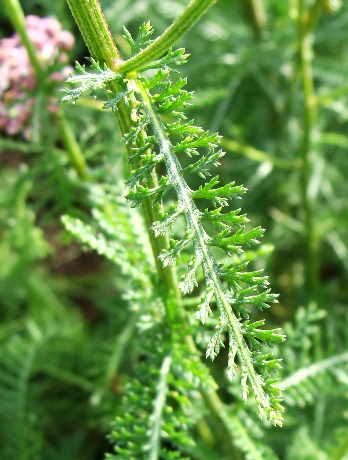
These can be used either dried or fresh to make an infusion; some recipes will also use the powdered form. Check out the additional tips section for tips on how to harvest and dry this herb.
Let's start:
- Begin by placing 1 teaspoon of dried yarrow in a teapot per cup of tea you are making. Alternatively you can use 1 tablespoon of chopped fresh leaves or 2-3 whole leaves.
- Bring water to a boil (100 C) and pour into the teapot.
- Let the tea steep for 10 minutes. The longer the tea steeps the stronger the flavor will be and may become too bitter to drink.
- Strain your tea into a cup and then you can add a slice of lemon and a teaspoon of honey to sweeten your herbal tea and take the bitter edge off its the taste. Some say that the flavor of this tea is similar to that of tarragon.
- Drink while still hot, particularly when treating a cold and breaking a fever.
- You can drink up to 3 cups of yarrow tea a day, but for no more than 2 weeks. Prolonged use is not recommended.
Additional Tips
- Yarrow tea blends well with other herbs, some may be used to improve the flavor as well as enhance the benefits of the herbal teas. For example, yarrow and eucalyptus can be blended and as you inhale the steam from this infusion it may help clear sinus issues and congestion.
- Mint, elderflower and yarrow tea is a great blend to drink when you have the flu or a cold with a fever. Mint not only improves the flavor of yarrow, but as with elderflower these herbs boost the immune system and fight the first symptoms when you get sick. You may also try blending chamomile.
- Yarrow and mullein tea is a blend that you can drink when you are suffering from lung issues and coughing. And in case of allergies, you can clear up your congested sinus by adding goldenseal to your cup of yarrow tea.
- Yarrow tea may be used to create healing herbal baths. It may help to alleviate skin irritations, but make sure to test on a small portion of your skin first. As a footbath, it is said to be useful for chilblains. When applying this tea topically always be sure to let it cool down before placing on the skin.
- If you are lucky to have yarrow growing in your garden, make sure to only use it if it has not been exposed to chemicals. Harvest yarrow when in bloom and then let it dry by hanging upside down in a warm dry place. Make sure to store in an airtight container to preserve it for a longer period of time.
Buy Your Yarrow Tea Today!
Brew a cup of this healing herbal tea using organic yarrow flowers, cut and sifted.
There is also an option to buy powdered yarrow if it suits your particular needs better.
Yarrow tea is a healing herb full of potential benefits, so make sure to have some around the house for any scrapes or cuts.
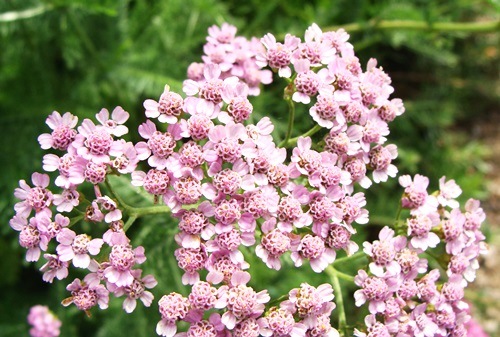
Enjoy your cup of tea!
Return from Yarrow Tea to Herbal Teas
Return to The Right Tea Homepage
”While there's tea there's hope.” - Sir Arthur Wing Pinero (1855-1934), British actor

Do you have a question? Then feel free to Contact Us!
And don’t forget to follow us on Facebook to receive updates, photos and interesting tips and news! Follow us also on Pinterest!
Search Website:
Be healthy
with a wide
choice of herbs!

Prepare your tea!
Try these
Tea Samplers!

Wellness Pack at ArtofTea.com

Award Winning Pack ar ArtofTea.com
Find other
tea time items at ...





